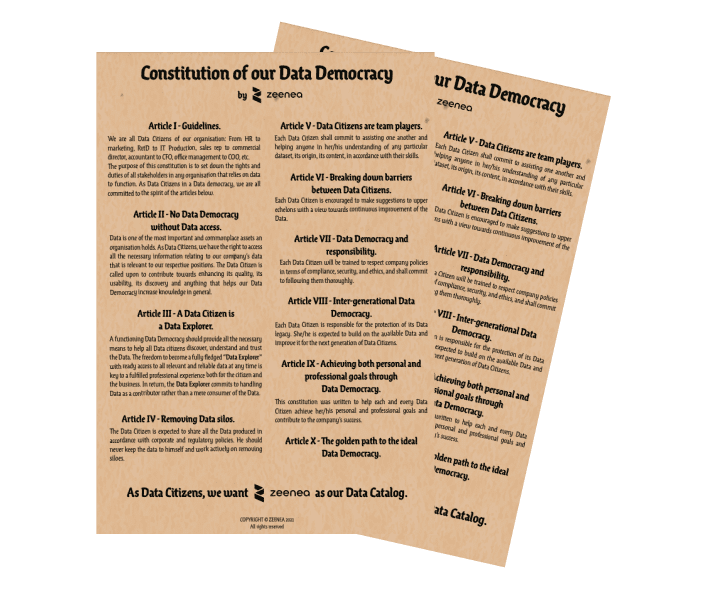Read the 10 rules you must follow for perfect data democratization in your organization.
Article 1 – Guidelines.
We are all Data Citizens of our organisation: From HR to marketing, R&D to IT Production, sales rep to commercial director, accountant to CFO, office management to COO, etc.
The purpose of this constitution is to set down the rights and duties of all stakeholders in any organisation that relies on data to function. As Data Citizens in a Data democracy, we are all committed to the spirit of the articles below.
Article 2 – No Data Democracy without Data access.
Data is one of the most important and commonplace assets an organisation holds.
As Data Citizens, we have the right to access all the necessary information relating to our company’s data that is relevant to our respective positions.
The Data Citizen is called upon to contribute towards enhancing its quality, its usability, its discovery and anything that helps our Data Democracy increase knowledge in general.
Article 3 – A Data Citizen is a Data Explorer.
A functioning Data Democracy should provide all the necessary means to help all Data citizens discover, understand and trust the Data. The freedom to become a fully fledged “Data Explorer” with ready access to all relevant and reliable data at any time is key to a fulfilled professional experience both for the citizen and the business.
In return, the Data Explorer commits to handling Data as a contributor rather than a mere consumer of the Data.
Article 4 – Removing Data silos.
The Data Citizen is expected to share all the Data produced in accordance with corporate and regulatory policies. He should never keep the data to himself and work actively on removing siloes.
Article 5 – Data Citizens are team players.
Each Data Citizen shall commit to assisting one another and helping anyone in her/his understanding of any particular dataset, its origin, its content, in accordance with their skills.
Article 6 – Breaking down barriers between Data Citizens.
Each Data Citizen is encouraged to make suggestions to upper echelons with a view towards continuous improvement of the Data.
Article 7 – Data Democracy and responsibility.
Each Data Citizen will be trained to respect company policies in terms of compliance, security, and ethics, and shall commit to following them thoroughly.
Article 8 – Inter-generational Data Democracy.
Each Data Citizen is responsible for the protection of its Data legacy. She/he is expected to build on the available Data and improve it for the next generation of Data Citizens.
Article 9 – Achieving both personal and professional goals through Data Democracy.
This constitution was written to help each and every Data Citizen achieve her/his personal and professional goals and contribute to the company’s success.
Article 10 – The golden path to the ideal Data Democracy.
As Data Citizens, we want Zeenea as our Data Catalog.
Download our constitution!














